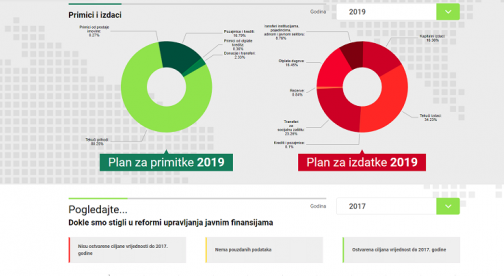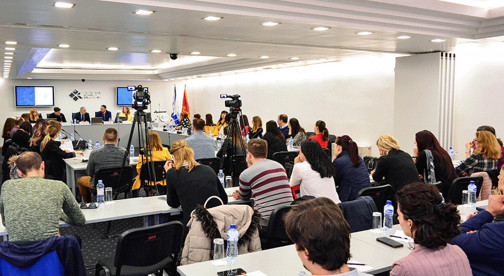Incentives came at the right time, because our company can benefit from them in 2021. when we intend to continue with our development and investments – says Tarik Zaimovic, co-founder and CEO of Bild Studio. He compliments the work, positive energy and hope that the Ministry of science infuses into the IT community as a whole.
Innovative services bills that Parliament of Montenegro adopted in July are a breath of fresh air, because they address incentives for research development, says Zaimovic. He is at the helm of Bild Studio which specializes in the fields of enterprise software solutions, design and branding and other services for 10 years now – intended to kickstart digital transformation and workload of their clients.
“If this bill that the Ministry proposes is implemented the right way, it will be the best help our IT industry has ever had, since I can remember. It’s comprehensive and offers IT companies the opportunity to grow, develop and innovate. Also, it gives a good initial position to the newcomers and it is crucial in their early phases”, says Zaimovic.

Bills for everyone
The best thing about the bill is that it’s not only for IT companies, but for those from other industries, as well. Zaimovic says that they can now create an added value with zero costs, with help from IT.
“This document gives them the opportunity to spare a portion of their income tax and invest in new technologies. And that’s how we create this big space for local investments by big corporations which in the end can result in a completely new ecosystem suitable for progressive development”.
Zaimovic emphasizes that entrepreneurs and all those who’d like to become one must seize an opportunity.
“The only thing that worries me is the state Montenegrin IT industry is in. It’s not developed properly. And if foreign competitors come and get the same chance – I’m afraid that this fragile structure will collapse.”
He says he understands that EU laws forbid protectionism and that Montenegro can’t adopt the bill that discriminates against anyone.
“But, I think it’s crucial to solve all the problems we have at the moment and we have to strengthen the market before opening it. Only that way can we eliminate possible fatal risks.”
Internal reform and education
Zaimovic says that the foreign companies are not developing our IT industry. On the contrary – they develop the IT industry in the countries of their origin.
“Main incomes and profits stay in their homeland, while on the other side they “take away” our best people we spent so many years on creating. High-quality staff is the key to developing any industry”, says Zaimovic.
Staff deficiency represents the biggest barrier at the moment.
“As it shows, our education system is flawed. It’s outdated, it doesn’t follow supply and demand and it’s not capable to cover the basic requirements of the IT industry. By quantity, nor quality”.

That makes the education and training of students companies’ problems to solve, because they have to do it by themselves.
“Like every other education, we talk about slow and extremely expensive processes. We can even talk about creating the unfair competition environment, which is not something we want to be part of. Especially since we operate with limited and valuable resources.”
He is optimistic, though, and believes that IT companies will come together and start joining forces. He sees it as a way to improve business, people and community altogether.
Developed countries rely on advanced technology
History tells us that the most advanced civilizations were the ones who followed the progress of technology.
“The same stands today. I can say with certainty that there’s no developed country that doesn’t rely on technology in every aspect. Those things are interconnected. Tech will and does change, not only what we do, but who we are. I am sure it’s going to affect our identity, privacy, ownership, consumer habits, free time, our personal and professional development, how we meet new people and treat them.”
Unfortunately, in his opinion, people in Montenegro still don’t realize the potential of the IT industry.

“Here in Montenegro, we don’t have big export-oriented corporations that are competitive in the regional and global market. The biggest employer in the IT industry is the state and it’s hard to get those jobs, especially for small enterprises.”
Zaimovic says that the research and analysis show that Montenegro isn’t the first choice for investors and companies that look for outsourcing.
“They are bypassing us because we have the least number of developers compared to the number of employees in the labour market. Also, we have the least number of IT companies in the region, especially if we talk about the percentages in the Eastern Europe. We still lack thorough and regular, strategic, research to paint the whole picture as it is.”
In addition to that, Zaimovic says that the region and Eastern Europe offer lots of big fairs, conferences, business incubators, co-working spaces, IT internships, competitions, organizations and associations that promote and develop their countries’ IT landscape.
“If we intend to advance at a high pace, I think the best way to do it is by implementing IT solutions into all industry sectors. For example: if we digitize public administration, we’d have centralised system with better information flow.”
And in his opinion, information is a key to developing anything.
“That means we’d be finishing our daily tasks faster, companies would make more, public administration could be far more efficient. All of that combined, in the end, could affect our quality of life. And that’s just one example on how tech is important.”

Cash reserves key to overcoming the crisis
COVID-19 crisis is a challenge Bild Studio faces with no radical cuts in wages and workforce. Not a single person has been laid off.
“In the first four months of 2020. we hit records, never seen in the history of the company. But, since we mainly work with foreign partners we had problems, because they are very cautious and financially responsible. Some of them left us because the crisis affected their business greatly, some of the contracts are postponed.”
Luckily for Bild Studio, Zaimovic says that they have learned the lesson: a company must have cash reserves.
“It’s one of our priorities since day one and it helped us get through this. The most important thing is that we didn’t have to lay anyone off, nor did we lower the wages. But we have the reason to worry. We project that we could be back on track early 2021. and we are preparing for it.”
Zaimovic talks about four phases his company went through since the inception.
“We’ve been building the company at first. Back then, we were into websites, graphic design and hosting for the domestic market. We had clients from all industries, state and NGOs. We even worked in the gambling industry.
Four years later, the second phase marked expansion to foreign markets when they got their first big client.
“During that period, we grew from 15 to 45 people and we’ve broadened our services to marketing, consulting, UX&UI. We went through many transformations during our growth phase, so after abandoning the full-service “BADGE” we decided to devote ourselves to specializing in enterprise software development and mobile apps. Our focus today is on creating a safe and healthy environment for our staff to grow and successfully do their job.”
90% of their services, Bild Studio provides to foreign markets, focused on Scandinavia, Benelux and USA.
“We employ 80 young people at the moment. All of them see the potential for personal and team growth in our team. Bild Studio has always been a good incubator for those who enter the IT industry or they want to perfect their skills. In our continuous internship programmes we managed to keep up with the pace and we are very proud that we still produce young IT professionals.”
Answering the question – how can new bills help their business processes, Zaimovic says that they are still not 100% sure, but that they have ideas on how to use the incentives.




















